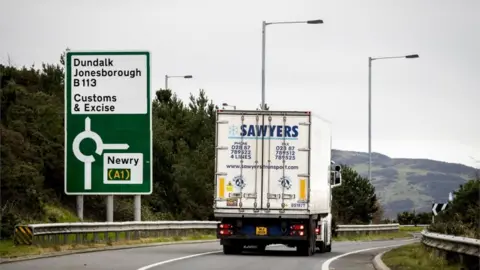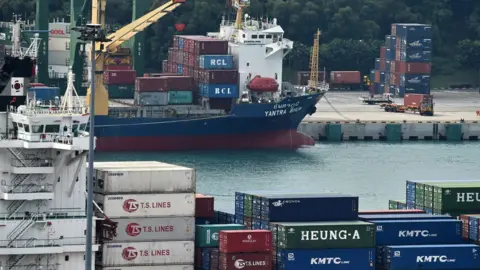WTO rules: What happens if there's a no-deal Brexit?
 PA
PAThe UK government has been consistent in saying that even if there is no deal, it does not intend to bring in any new checks on goods crossing the border - is that feasible?
Let's take a step back : If there is no deal, then the UK is going to be trading with the EU and the rest of the world on what are known as World Trade Organisation (WTO) terms.
These are the most basic set of rules for trade; they set out how far and in what ways each member guarantees to keep its markets open to all other members.
WTO terms mean tariffs on some goods, particularly food and agriculture, and much higher barriers to trade compared to the EU single market.
The most important WTO principle is that you do not discriminate, so if the UK government refused to check goods crossing the Irish border, then it also could not check goods arriving into UK ports from China, Brazil or anywhere else.
But if the UK said Ireland was a special case and continued to check goods at other ports, then what would happen?
No enforcement body
Former WTO negotiator, Dmitry Grozoubinski, argues that if the UK were to breach those WTO rules by having an open border for Ireland but maintaining goods checks on its other borders, the immediate practical impact would be effectively nothing.
That is because there is nothing like a WTO enforcement body that is immediately going to charge the UK, or force a policy change.
The WTO is a member-driven organisation, so another member would have to make a complaint. The first stage would simply be an uncomfortable meeting for the UK, at which other members would express their displeasure.
But still nothing would prevent the UK from keeping an open Irish border.
There would then be a 60-day period in which the UK and whoever complained would try to resolve the issue. If the UK could not talk this member down, a WTO Panel would be convened and a formal case begun.
Going rogue
If the panel were to find the open Irish border policy to be in breach of the rules, the UK would still get another chance to discuss compensation with the complainant, and at the very end of the process the panel could authorise "retaliation".
 Getty Images
Getty ImagesThat means working out how much the UK's border policy has disadvantaged the complainant, and letting them levy higher tariffs on the UK to balance that out.
But by the time that happened it would be 2021 or even 2022, and the WTO still could not actually make the UK change its policy.
But that would surely be a reckless move by the UK at a time when it is trying to persuade other countries to sign trade deals.
Going rogue at the WTO would certainly be an eye-catching start to an independent trade policy but if the UK did go through with something like this there would be massive pressure on the EU and the Irish government.
The Irish government has been insistent that even in a no-deal situation it would not be imposing border checks.
But if the situation persisted for more than a couple of months, I am not sure that would be sustainable.
The Institute of Economic Affairs (IEA) touched on this issue in its "alternative to Chequers" plan.
It suggested that one way to get around the non-discrimination requirement of the WTO would be to apply for a national security waiver.
In limited circumstances, WTO rules can be broken if it is a requirement of a member state's national security.
The IEA said: "While waivers are narrowly drawn, the potential for conflict in Northern Ireland and a return to the Troubles would appear to be fully justify any request for a WTO waiver."
"It is extremely unlikely that any WTO member will complain, given the question of the security of Northern Ireland. It is open to the EU to do the same, and if it does not, it would need to explain this to the Republic of Ireland."
WTO experts tell me this is a reasonable interpretation of the organisation's rules.
The IEA suggests such a waiver could be in place for an initial two years.
But the key point remains: Even if the WTO is on side, would the EU and its member states tolerate a situation where there is an open backdoor into the single market for more than a couple of months?
